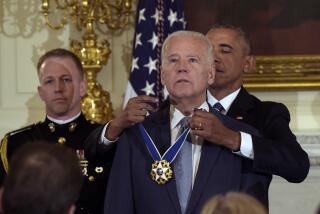Candidates’ distinctions blur on Iraq
- Share via
WASHINGTON — It was 4:12 a.m. Wednesday when Hillary Rodham Clinton finally got her chance to address the Senate in support of a deadline for withdrawal from Iraq. Barack Obama snagged less time to speak, but at least his slot around 10 a.m. was in the daylight hours. After that, the usually loquacious Joseph R. Biden Jr. had just a minute to speak.
The senators who are also trying to win the Democratic presidential nomination took a detour from the campaign trail to join the Senate’s all-night debate on Iraq, voting in support of the unsuccessful proposal to force President Bush to remove combat troops by April 30, 2008.
But what looked like unity on the Senate floor masked a scramble on the campaign trail, where the candidates are trying to harness anger among the party’s base over the war.
Obama (D-Ill.) is increasingly trying to sharpen his antiwar credentials by reminding voters that Clinton (D-N.Y.) initially backed the 2002 U.S. invasion, whereas Obama, then a state senator, opposed it. Biden (D-Del.) is touting a plan for dividing Iraq into three aligned regions.
Within the Senate chamber, however, the effort by Democrats to present a unified opposition to Bush’s Iraq policy has also had the effect of blurring distinctions among the party’s presidential candidates. That could end up benefiting Clinton, who has tried to negate criticism of her 2002 vote by arguing that differences among the Democratic candidates are not that great today.
That was evident during the all-nighter on the troop withdrawal amendment.
The candidates said similar things, and in the end those three joined the other Democratic presidential hopeful in the Senate, Christopher J. Dodd of Connecticut, in voting to end the GOP filibuster. The effort failed in a 52-47 vote, short of the 60 needed to cut off debate under Senate rules.
That convergence among the Democratic presidential candidates was a far cry from just a few months ago, when Clinton opposed a withdrawal deadline and was heckled by party activists for it.
Although she never bowed to activists’ demands that she apologize for her 2002 vote, she has steadily softened her position in other ways in recent months. She proposed putting a cap on the number of troops in Iraq, called for a vote to reverse the 2002 war authorization and voted against a war funding bill because it did not call for a troop withdrawal.
But Obama has modified his position as well: Not long ago, he backed a flexible withdrawal target rather than a mandatory deadline. He also voted against the war funding bill.
“There’s not a dime’s worth of difference between them,” said John Isaacs, president of Council for a Livable World, an antiwar group.
But out on the campaign trail, the issue is a point of tension among the candidates, as some try to distinguish themselves and open daylight between their positions on Iraq.
After the Senate proved unwilling to end the filibuster, which effectively put off further debate on the war until September, candidates from outside Congress criticized the vote.
New Mexico Gov. Bill Richardson on Tuesday released a new television ad in Iowa calling on Congress to “stand up” to Bush and end the war. Former Sen. John Edwards of North Carolina used similar language and complained that, even if it had passed, the Senate withdrawal timeline was too slow.
Meanwhile, Obama has made a concerted effort to distinguish himself as the only candidate who opposed the war at the outset. This week he sent a mailer to Iowa Democrats touting that record, citing it as evidence of greater leadership and judgment than his opponents.
“You can tell a lot about leaders by the choices they make,” the mailer said. “Barack Obama said ‘No’ to the war from the start.”
He recently chided Clinton, but not by name, for her shifting positions. “Being a leader means that you’d better do what’s right and leave the politics aside, because there are no ‘do-overs’ on an issue as important as war,” Obama said in Iowa this month. He lifted the phrase from Clinton, who often said she would not apologize for her vote to authorize the war in Iraq because there are no “do-overs” in life.
Clinton supporters are betting that voters will be looking forward to how the next president will handle Iraq, not backward to how they stood in 2002.
In a new effort to reach antiwar Democrats in Iowa, Clinton’s campaign has mailed a DVD to voters featuring a “conversation with Iowans on the war.” But even as she assured voters of her commitment to ending the war, the video included testimonials to her hard-nosed experience with military and foreign policy, which her supporters believe is a big advantage over Obama.
“There is also [in Clinton] a toughness and an understanding of the necessity that government’s fundamental responsibility is to make sure we are safe,” former Gov. Tom Vilsack says in the DVD.
Whatever the remaining differences between Clinton and Obama on Iraq, they pale in comparison to the 2004 Democratic primary fight, when Howard Dean staked out an antiwar position far removed from the more cautious stance of his rivals.
But in the 2008 race, said Isaacs, “the issue has largely been neutralized among Democratic candidates, because there is no war supporter -- no one who says give the president a chance. The primary now turns on other issues.”
--
More to Read
Get the L.A. Times Politics newsletter
Deeply reported insights into legislation, politics and policy from Sacramento, Washington and beyond. In your inbox three times per week.
You may occasionally receive promotional content from the Los Angeles Times.











